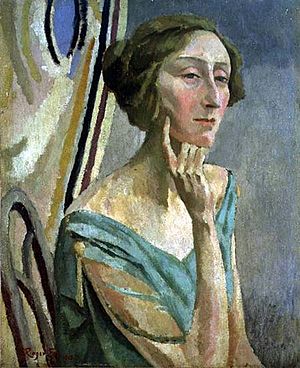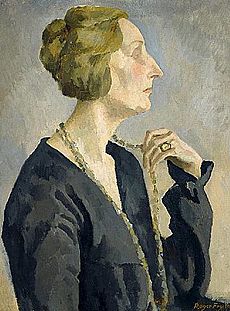Edith Sitwell facts for kids
Quick facts for kids
Edith Sitwell
|
|
|---|---|

Portrait of Edith Sitwell by Roger Fry, 1915
|
|
| Born | Edith Louisa Sitwell 7 September 1887 Scarborough, North Riding of Yorkshire, England |
| Died | 9 December 1964 (aged 77) London, England |
| Occupation | Poet |
| Nationality | British |
| Parents | George Sitwell Lady Ida Denison |
| Relatives | Osbert Sitwell and Sacheverell Sitwell (brothers) |
Dame Edith Louisa Sitwell (7 September 1887 – 9 December 1964) was a famous British poet and critic. She was the oldest of three well-known writers in her family, often called "the literary Sitwells".
Edith had a difficult childhood with her parents. She spent much of her life with her governess, Helen Rootham. Edith never married, but she had a close friendship with the Russian painter Pavel Tchelitchew. Her home was always open to other poets in London. She was known for being very kind and helpful to them.
Edith started publishing poetry in 1913. Some of her poems were abstract and even set to music. She had a very dramatic style and wore unique costumes. Some people thought she was just trying to get attention. However, her work was praised for its strong technique and careful writing. She received the Benson Medal from the Royal Society of Literature for her contributions.
Contents
Early Life and Family
Edith Louisa Sitwell was born in Scarborough, England. Her father was Sir George Sitwell, 4th Baronet, who was an expert on family history and gardens. Her mother was Lady Ida Emily Augusta.
Edith had two younger brothers, Osbert and Sacheverell. Both of them also became famous authors and worked together on many projects. Edith often said her childhood was "extremely unhappy." She felt her mother had "terrible rages" and that she rarely saw her father.
Her relationship with her parents was very difficult. For example, her father made her wear an iron frame. He thought it would fix a problem with her spine. Edith wrote that her parents always felt like strangers to her.
Life as an Adult

In 1914, when Edith was 26, she moved to a small flat in London. She shared it with Helen Rootham, who had been her governess since 1903. Edith never married during her life.
In 1918, she met the poet Siegfried Sassoon. They became very good friends. Throughout the 1920s and 1930s, Edith often asked Sassoon for his thoughts on her poems. He even wrote a very positive review of her poem Façade in 1922. He said she would succeed just like the artist Aubrey Beardsley.
In 1927, Edith became very close to the Russian painter Pavel Tchelitchew. They had a strong friendship. Edith often helped him with money and promoted his artwork. Their friendship lasted for 30 years, until his death.
In 1930, Edith published a book about the poet Alexander Pope. In her book, she argued that Pope was a great writer. She also said he was an early influence on Romanticism.
Edith's mother passed away in 1937. Edith did not go to the funeral because of her difficult childhood. Helen Rootham, her dear friend, died in 1938.
During World War II, Edith returned to England from France. She lived at Renishaw Hall with her brother Osbert. The house had no electricity, so she wrote by the light of oil lamps. She also knitted clothes for friends who were soldiers, like the actor Alec Guinness.
The poems she wrote during the war became very popular. These included Street Songs (1942) and The Shadow of Cain (1947). Her poem "Still Falls the Rain," which was about the London Blitz, is one of her most famous. The composer Benjamin Britten even set it to music.
In 1948, Edith toured the United States with her brothers. They recited their poetry to audiences. Edith also made recordings of her poems, including two versions of Façade.
Edith was honored as a Dame Commander of the Order of the British Empire (DBE) in 1954. In 1955, she became a Catholic. She asked the famous author Evelyn Waugh to be her godfather.
Edith wrote several successful prose books. These included Fanfare for Elizabeth (1946) and The Queens and the Hive (1962), both about Queen Elizabeth I of England. She also wrote English Eccentrics (1933) and Victoria of England [sic] (1936). She often said she wrote these books mainly to earn money.
In November 1962, Edith was featured on the TV show This Is Your Life. She was surprised by the host, Eamonn Andrews. From 1961 until her death, Edith lived in a flat in Hampstead, London. A special English Heritage blue plaque now marks her home.
Later Years and Passing
Around 1957, Edith began using a wheelchair. She had struggled with Marfan syndrome throughout her life. In 1959, she was interviewed about her life and work on the BBC TV show Face to Face.
Her last poetry reading was in 1962. The next year, she received the title of Companion of Literature from the Royal Society of Literature. She was the first woman to receive this honor.
Edith Sitwell passed away in London on 9 December 1964, at the age of 77. She is buried in the churchyard of Saints Mary and Peter in Weedon Lois, Northamptonshire. Her writings and papers are kept at the Harry Ransom Center in Texas.
Her Poetry and Writings
Edith published her first poem, The Drowned Suns, in the Daily Mirror in 1913. From 1916 to 1921, she edited Wheels. This was an annual collection of poems she created with her brothers. This group was known as "the Sitwells".
In 1929, she published Gold Coast Customs. This poem explored how people sometimes act fake and the wildness that can be hidden underneath. The poem used the rhythms of tom-toms and jazz. It showed her great skill in writing. Her early work was much influenced by French symbolists.
Edith supported new and different styles in English poetry. She did not like poets who stuck to old, traditional ways. Her flat became a place where young writers could meet. She wanted to befriend and help them. These writers included Dylan Thomas and Denton Welch. She also helped to publish the poems of Wilfred Owen after he died.
Edith's only novel, I Live Under a Black Sun, was published in 1937. It was based on the life of Jonathan Swift.
Images for kids
See also
 In Spanish: Edith Sitwell para niños
In Spanish: Edith Sitwell para niños
 | Percy Lavon Julian |
 | Katherine Johnson |
 | George Washington Carver |
 | Annie Easley |



